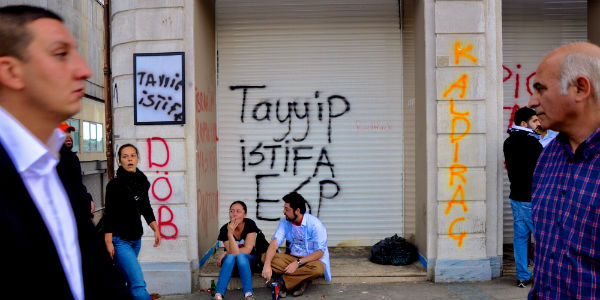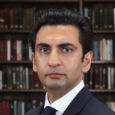Repression, terrorism and fear: Erdoğan’s Turkey heads for the brink
Turkey is in trouble. The failed coup last July gave President Erdoğan further excuse to crack down on opposition parties, the media and academia. Tahir Abbas, who left the country ten days before the abortive putsch, looks at how a country regarded as the great hope of the Muslim world came to be governed by an autocrat and plagued by terrorism.

‘Tayyip [Erdogan], resign’ – graffiti in Istanbul, 2013. Photo: Lauren Bohn via a CC_NY-NC-SA 2.0 licence
On the night of 15 July 2016, over 350 people died and thousands lay injured after the failed coup in Turkey. I had left the country just ten days earlier. We know what happened on the streets that night – but we still do not know exactly who was behind the coup.
Was the Turkish government made aware of the coup hours before it was due to take place, and then used the event as a form of power play, as has been suggested by journalist, Ahmet Sik – who is now in jail? Was it an attempt to further push out the Gülenists, a process that began in 2013? Or to get rid of the Atlanticist generals, replacing them with pro-Europeans? Was it aimed at marginalising the opposition, especially the pro-Kurdish HDP – arguably the only party to stand up to President Erdoğan? Was it an attempt to consolidate power over the media, closing hundreds of outlets and taking over many others, as well as locking up journalists and commentators? Or was it part of an effort to silence academics? Some were willing to speak out, but after the failed coup they were dismissed or faced trial.
While all these had been going on for months, the reality of the failed coup gave Erdoğan’s ruling AKP the opportunity to further ostracise a whole host of groups thought to be acting against the government’s interests.
In the six years I lived and worked in Istanbul, the nation changed from the picture of an ‘economic miracle’ balancing capitalism, Islam and democracy, to a country now seen as governed by plutocratic and autocratic tendencies combined with growing Islamism, and perennially on the brink of a deeper malaise.
Every major world civilisation has crossed Turkey – settling, conquering (the defeat of the Byzantines), absorbing (the Ottoman Empire’s millet system) and wiping out others ( the Armenian genocide). But it also moved from the centre of the Muslim world to a secular republic in a matter of a few years. In the process, it rendered the majority of its population illiterate overnight (due to the drastic changes to the language). It ultimately created a virulent form of hyper-nationalism that focused on Islam as a cultural rather than religious identity. The new state was organised around a language spoken only by the elite.
The group worst affected by these changes were the Kurds, who are an ethnic and linguistic minority, but were not classified as religious minorities in the 1923 Lausanne Treaty in the same way Christians and Jews were. At the turn of the 19th century, there were 20m people living in Ottoman territories, of whom 25 per cent were minorities: Jews, Christians and Alevis. Today, in a population of around 70m, fewer than 100,000 belong to religious minorities. A great deal has changed, but Turkey’s future remains very uncertain. It is unclear whether the EU really wants Turkey to join – or vice versa. Both sides realise that it will probably never happen, but both are happy enough to play along as an application for EU membership fulfils certain immediate aims, namely trade and tourism.
The rise of Erdoğan
Meanwhile, the EU-led refugee deal keeps Syrians fleeing conflict inside Turkish borders and away from the EU. This suits the latter, especially as the rise of populism and the crumbling of the traditional left has created political vacuums. In this race for ever-greater forms of populism, Erdoğan operates in the same space as Trump, Farage, Wilders and Le Pen.
Recep Tayyip Erdoğan has been leader of the AKP since 2001, becoming Prime Minister in 2002 and then President in 2014. He served three whole terms: each time the AKP increased its majority. As president, he now has absolute power – and absolute power corrupts absolutely, as the maxim goes. Relations between the AKP and Gülen movement began to falter as early as 2010. This accelerated in December 2013 as corruption concerns were raised in relation to Erdoğan and members of his family. The alliance between AKP and the Gülen movement, once a healthy one, turned bitter and acrimonious. But because Erdoğan has ultimate state power, there was only going to be one winner in this battle for the future of Turkish Islam.
Erdoğan has shored up his position among the 50 per cent of the population wholly devoted to him. He can do no wrong. He is also hugely popular among diaspora Turks, especially in Germany and Belgium. There is every reason to suggest that he will stay in power at least until 2023, if not longer – becoming the most important political figure in Turkish history, superseding Ataturk. Furthermore, while Erdoğan was committed to a peace process with the Kurds in 2012, it came to a dramatic halt in June 2015. Since then there have been over 30 terrorist incidents in Turkey, carried out by Islamic State, an offshoot of the PKK known as the TAK or far-left anti-capitalist groups.
The recent attack on the Riena nightclub in a swanky part of Istanbul shows IS’ determination to target a site popular with both tourists and local elites. But the fact that a nightclub was attacked was no accident either. Turkey is ostensibly a Muslim country, with a significant element of the population increasingly describing themselves as pious and conservative believers who uphold the tenets of Sunni Islam. By attacking a well-known nightclub, Islamic State aimed to appeal to an element of Turkish society theologically predisposed to decry what are regarded as grossly un-Islamic entities – something that the government were promoting in recent weeks by discouraging Turks from engaging in a consumerist Christmas. There is a rising Islamism among certain sections of the youth. Some are from families who are loyal to the AKP and hold Islamist sympathies. This strategy creates further fissures between pro-AKP conservatives and anti-AKP secular and liberal segments of the population, while crowding out space for liberal Muslims or conservative but secular groups. There is limited opposition to the AKP, and what does exist is disparate and divisive.
The quelling of dissent
Turkey sits on one of the most important strategic fault lines in the world, with the failed Arab Spring and Islamic State on one side, and Greece, at the mercy of the EU, on the other. But while Turkey’s GDP averaged 5 per cent throughout the 2000s, the ongoing fall of the lira relative to major world currencies means there is every sign of a relatively hard landing for the economy and society, especially as there are already widening regional income and wealth disparities.
Turkey is heading down a deeply dangerous path that is potentially destabilising for the whole of the Middle East. It faces isolation in the region. Many people remember the 1980s and 1990s, when ethnic and sectarian violence was the norm, people were intensely divided, politically, culturally and economically, and a dark cloud hung over the nation. The irony is that half the nation regards AKP actions as entirely acceptable in the current climate of far left terrorism, Islamic State bombings and the perennial bogeyman, the PKK, resurfacing as Turkey’s most sinister enemy within. With an immense electoral mandate, having obtained nearly half the national vote in November 2015, the AKP leadership sees itself as untouchable. Such hubris is precarious.
Shutting down newspapers, closing television stations and silencing journalists (and academics) who challenge the status quo do not help, especially in relation to how the world sees Turkey. With approximately 95 per cent of all print outlets in the hands of pro-government management or leaning that way, the space to engage with Turkish politics has narrowed considerably. Society is being inculcated by a form of majoritarian nationalism with an increasingly Islamist tint. Secularism can only provide opportunities for different religious systems to flourish if they do not veer towards ethnic nationalism, which is often unstable and regularly problematic. The historic polarisations between Islamist and secularist, conservative and liberal, relativists and purists, pro-European and anti-European could not be wider in Turkey right now.
This post represents the views of the author and not those of Democratic Audit.
 Professor Tahir Abbas FRSA is Senior Research Fellow at the Royal United Services Institute in London. His latest book is Contemporary Turkey in Conflict, published by Edinburgh University Press in December 2016.
Professor Tahir Abbas FRSA is Senior Research Fellow at the Royal United Services Institute in London. His latest book is Contemporary Turkey in Conflict, published by Edinburgh University Press in December 2016.





 Democratic Audit's core funding is provided by the Joseph Rowntree Charitable Trust. Additional funding is provided by the London School of Economics.
Democratic Audit's core funding is provided by the Joseph Rowntree Charitable Trust. Additional funding is provided by the London School of Economics.